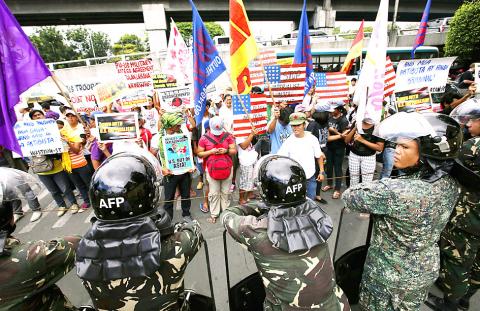Thousands of Philippine and US soldiers began annual war games yesterday, the first under a new security pact with the US, focusing on maritime security in the face of China’s growing naval presence in the disputed South China Sea.
The “Balikatan” (shoulder-to-shoulder) joint exercises would test the combat readiness of the two allies in this part of the world to respond to any maritime threats, including piracy and humanitarian assistance and disaster response.
The new security pact was signed last week just hours before US President Barack Obama visited.

Photo: EPA
Obama said the agreement was a testament to Washington’s “pivot” to Asia and was an “ironclad” commitment to defend the Philippines.
The Philippines has territorial disputes with China over the South China Sea, which is said to be rich in energy deposits and carries about US$5 billion in ship-borne trade every year.
The Spratly Islands (Nansha Islands, 南沙群島) in the South China Sea are also claimed by Taiwan, Brunei, Malaysia and Vietnam.
“Tensions in the Asia-Pacific region have increased due to excessive and expansive maritime and territorial claims, undermining the rule of law,” Philippine Foreign Affairs Secretary Albert del Rosario said at the opening ceremony at the main army base in Manila.
“The aggressive patterns of behavior aimed at changing the status quo threaten peace and stability in the region. Balikatan 2014, with its focus on maritime security, strongly supports our capabilities to address these challenges,” he said.
Asked about the exercises, Chinese Foreign Ministry spokeswoman Hua Chunying (華春瑩) said all sides needed to work “constructively” to maintain peace and stability in the Asia-Pacific region.
On Saturday, a Philippine Navy plane dropped food and water to troops stationed on a transport ship that ran aground on the disputed Second Thomas Shoal (Renai Shoal, 仁愛暗沙) in the South China Sea.
Chinese coast guard ships have set up a blockade around the shoal.
Nearly 5,500 US and Filipino troops are taking part in the two-week drills in different parts of the main island of Luzon.
The war games are to see US F-18 fighters rehearse bombing runs and troops involved in live fire drills.
Under a new security pact, the Enhanced Defense Cooperation Agreement, signed last week during Obama’s visit, the US is to have wider access to local bases and construct facilities to store supplies and equipment for 10 years in exchange for increased support on maritime security and humanitarian assistance.
The annual war games come under the 1951 Mutual Defense Treaty, part of a web of security alliances the US built in the Asia-Pacific region during the Cold War.
Dozens of leftwing activists protested outside the main army base in Manila, saying the Americans were using China as a bogeyman to gain a forward base in the Philippines.
“Our armed forces will not modernize just because we conduct war games with US forces,” left-wing group Bayan (Nation) Secretary-General Renato Reyes said.
“Our capacity to defend our territory against China will not be improved just because there are training exercises,” he added.

AGING: As of last month, people aged 65 or older accounted for 20.06 percent of the total population and the number of couples who got married fell by 18,685 from 2024 Taiwan has surpassed South Korea as the country least willing to have children, with an annual crude birthrate of 4.62 per 1,000 people, Ministry of the Interior data showed yesterday. The nation was previously ranked the second-lowest country in terms of total fertility rate, or the average number of children a woman has in her lifetime. However, South Korea’s fertility rate began to recover from 2023, with total fertility rate rising from 0.72 and estimated to reach 0.82 to 0.85 by last year, and the crude birthrate projected at 6.7 per 1,000 people. Japan’s crude birthrate was projected to fall below six,

US President Donald Trump in an interview with the New York Times published on Thursday said that “it’s up to” Chinese President Xi Jinping (習近平) what China does on Taiwan, but that he would be “very unhappy” with a change in the “status quo.” “He [Xi] considers it to be a part of China, and that’s up to him what he’s going to be doing, but I’ve expressed to him that I would be very unhappy if he did that, and I don’t think he’ll do that. I hope he doesn’t do that,” Trump said. Trump made the comments in the context

SELF-DEFENSE: Tokyo has accelerated its spending goal and its defense minister said the nation needs to discuss whether it should develop nuclear-powered submarines China is ramping up objections to what it sees as Japan’s desire to acquire nuclear weapons, despite Tokyo’s longstanding renunciation of such arms, deepening another fissure in the two neighbors’ increasingly tense ties. In what appears to be a concerted effort, China’s foreign and defense ministries issued statements on Thursday condemning alleged remilitarism efforts by Tokyo. The remarks came as two of the country’s top think tanks jointly issued a 29-page report framing actions by “right-wing forces” in Japan as posing a “serious threat” to world peace. While that report did not define “right-wing forces,” the Chinese Ministry of Foreign Affairs was

PREPAREDNESS: Given the difficulty of importing ammunition during wartime, the Ministry of National Defense said it would prioritize ‘coproduction’ partnerships A newly formed unit of the Marine Corps tasked with land-based security operations has recently replaced its aging, domestically produced rifles with more advanced, US-made M4A1 rifles, a source said yesterday. The unnamed source familiar with the matter said the First Security Battalion of the Marine Corps’ Air Defense and Base Guard Group has replaced its older T65K2 rifles, which have been in service since the late 1980s, with the newly received M4A1s. The source did not say exactly when the upgrade took place or how many M4A1s were issued to the battalion. The confirmation came after Chinese-language media reported